How Long Does Whiskey Last Unopened
Your unopened whiskey can last indefinitely when stored properly, as its high alcohol content acts as a natural preservative. To maintain ideal quality, you'll need to keep the bottle upright at a stable temperature between 59-68°F (15-20°C), away from direct sunlight and UV exposure. Proper humidity levels of 55-65% help prevent cork deterioration and seal integrity issues. While the whiskey won't technically expire, poor storage conditions can affect its taste, color, and overall quality through oxidation and chemical changes. Understanding proper storage techniques will help you protect your whiskey investment for years or even decades to come.
This post may contain affiliate links. If you make a purchase through these links, I may earn a commission at no additional cost to you. Additionally, portions of this post may be generated using artificial intelligence (AI) technology. While we strive for accuracy, please be aware that AI-generated content may not always be perfect and should be fact-checked when necessary.
The Spatula Scoops
- Unopened whiskey can last indefinitely when stored properly at stable temperatures between 59-68°F and away from direct sunlight.
- Quality remains consistent in sealed bottles as long as the cork maintains integrity and storage conditions prevent evaporation.
- Proper upright storage prevents cork degradation, which is crucial for maintaining whiskey's indefinite shelf life when unopened.
- UV protection and temperature stability are essential, as light exposure and temperature fluctuations can degrade even unopened whiskey.
- Unlike wine, whiskey doesn't age or improve in the bottle, so its quality remains unchanged if properly stored unopened.
Understanding Whiskey Storage Basics
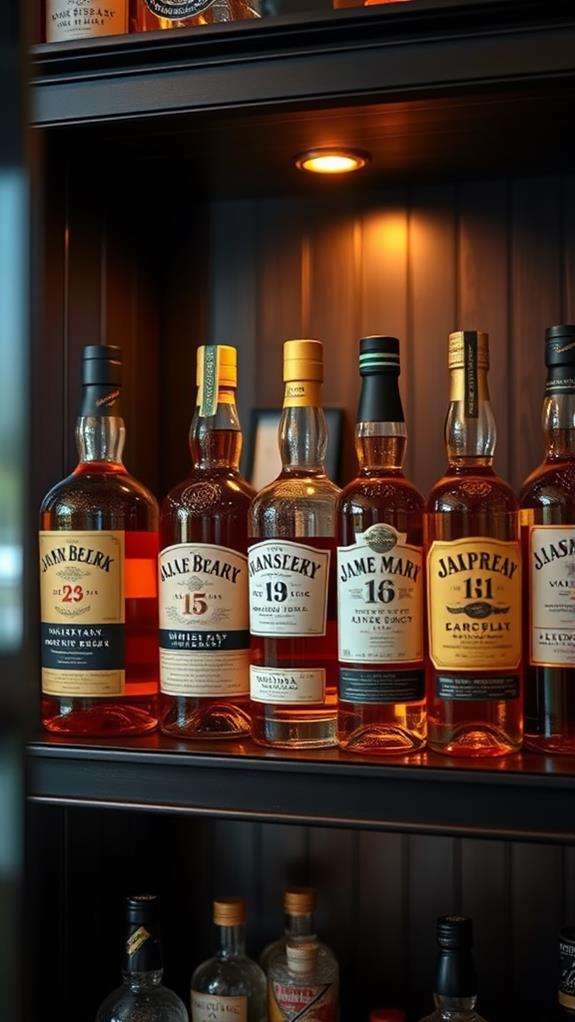
The proper storage of whiskey requires understanding a few fundamental principles that affect its longevity. Unlike wine, whiskey doesn't continue to age or mature once it's bottled, but improper storage can still negatively impact its quality and taste profile.
You'll need to focus on four key storage elements to maintain your whiskey's integrity. First, keep your bottles upright to prevent the high-alcohol content from degrading the cork, which can happen if the spirit's constantly in contact with it. Second, store your whiskey at room temperature, ideally between 59-68°F (15-20°C), as temperature fluctuations can affect the liquid's expansion and contraction. Third, avoid direct sunlight and UV exposure, which can break down organic compounds and alter the whiskey's chemical composition. Fourth, maintain a relatively stable humidity level to prevent excessive evaporation through the cork.
If you're storing your whiskey in its original packaging, you've got an extra layer of protection, as most manufacturers design their boxes or tubes specifically to shield their products from light and minor temperature variations. These fundamentals apply whether you're storing a budget blend or a premium single malt.
Optimal Storage Conditions
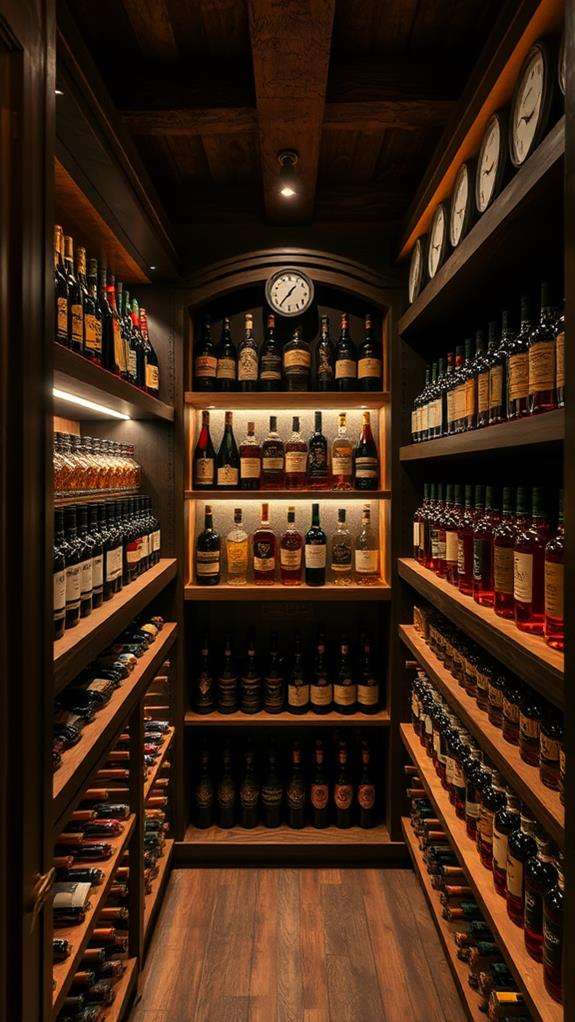
Building on these storage basics, creating optimal conditions for your unopened whiskey requires careful attention to specific environmental factors. You'll want to maintain strict control over these elements to guarantee your whiskey retains its quality for years to come.
| Storage Factor | Ideal Condition |
|---|---|
| Temperature | 59-68°F (15-20°C) |
| Light Exposure | Minimal to none |
| Humidity | 55-65% |
| Bottle Position | Upright storage |
| Air Circulation | Moderate |
To achieve these conditions, you'll need to select a storage location that's away from direct sunlight and heat sources. Your basement or a dedicated wine cellar often provides the perfect environment, as these spaces typically maintain consistent temperatures and humidity levels. Don't store your bottles near appliances that generate heat or in areas prone to temperature fluctuations, like garages or attics.
Always keep your whiskey bottles in an upright position to prevent the high-alcohol content from deteriorating the cork. You'll also want to guarantee there's adequate air circulation to prevent mustiness, but not so much that it causes temperature variations. These conditions will help preserve your whiskey's character and prevent any unwanted changes to its flavor profile.
Signs of Whiskey Quality Decline

While properly stored whiskey can last indefinitely, you'll need to watch for several warning signs that indicate quality decline. The most noticeable red flag is a change in color, where your whiskey might appear lighter or darker than its original hue, suggesting potential oxidation or chemical changes within the bottle.
You'll want to examine the bottle's seal carefully, as any compromises in the closure can lead to evaporation or contamination. If you notice the liquid level has dropped without the bottle being opened, that's a clear indication of seal failure. Pay attention to any crystalline formations or sediment at the bottom of the bottle, which shouldn't be present in properly maintained whiskey.
When you do open the bottle, be alert for any unusual odors. A musty, chemical, or plastic smell indicates something's wrong. The whiskey's clarity should remain consistent – if you notice clouding, floating particles, or a film on the surface, these are signs of serious quality deterioration. Even unopened, extreme temperature fluctuations can cause these issues, so you'll need to monitor your whiskey's appearance regularly for these warning signs.
Common Storage Mistakes
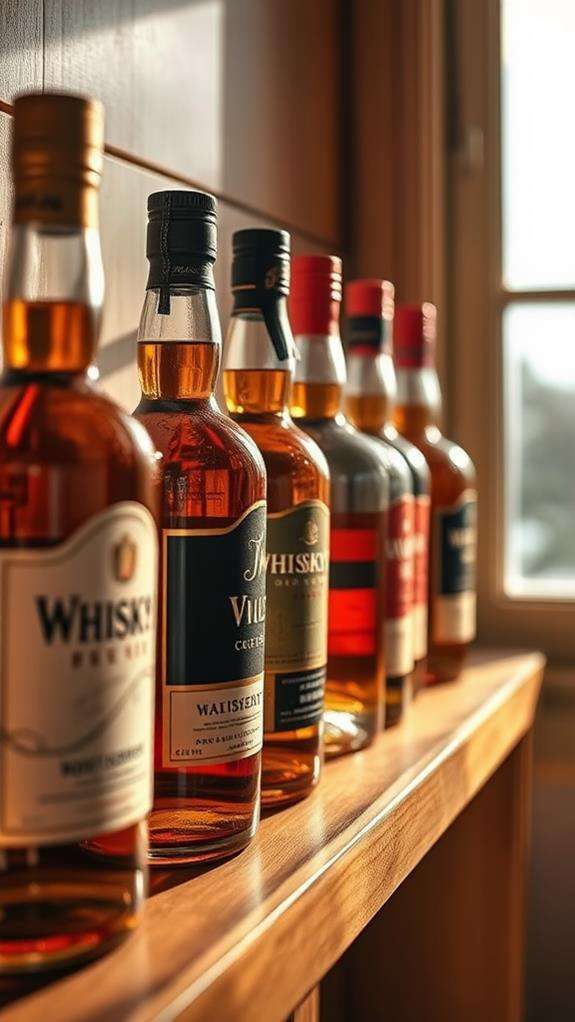
Many whiskey collectors unintentionally damage their prized bottles through preventable storage mistakes. You'll want to avoid these common errors to maintain your whiskey's quality and value over time.
One of the biggest mistakes you're likely making is storing bottles upright for extremely long periods, which can dry out natural corks and lead to oxidation. You should also avoid keeping whiskey near heat sources or in direct sunlight, as temperature fluctuations and UV exposure can degrade both the spirit and its container. If you're storing bottles in your basement, you're probably exposing them to excessive humidity, which can damage labels and encourage mold growth on the cork.
Don't make the mistake of storing whiskey bottles at varying angles or frequently moving them around, as this can cause the spirit to interact with the cork too much. You'll also want to avoid placing bottles near strong-smelling items, as whiskey can absorb external odors through the cork over time. If you're storing bottles in cardboard boxes, you're risking damage from moisture absorption and potential collapse of the storage container.
Environmental Impact on Sealed Bottles
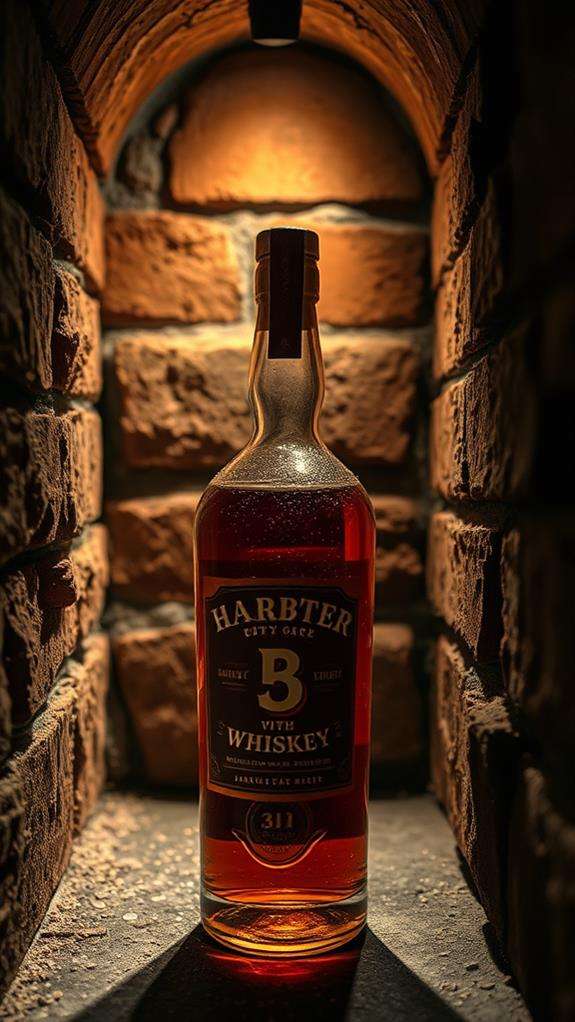
Environmental factors can considerably impact your sealed whiskey bottles, even when they appear safely stored away. When you're storing your collection, you'll need to account for various environmental elements that could affect the whiskey's quality and longevity, including temperature fluctuations, humidity levels, and exposure to direct sunlight.
- Temperature variations beyond 55-75°F (13-24°C) can cause your whiskey to expand and contract, potentially compromising the seal and accelerating the aging process.
- High humidity levels above 70% can deteriorate the label and cork, while extremely low humidity below 50% might cause cork shrinkage and eventual whiskey evaporation.
- UV radiation from direct sunlight or artificial lighting can trigger chemical reactions in your whiskey, leading to color changes and flavor degradation.
Your sealed bottles aren't completely immune to their surroundings, even with proper storage precautions. The molecular structure of whiskey continues to interact with its environment through micro-exchanges that occur at the closure point. That's why you'll often notice slight variations in whiskey bottles that have been stored for extended periods, particularly in less-than-ideal conditions. To maintain peak quality, you'll want to control these environmental factors as much as possible.
Protecting Your Whiskey Investment
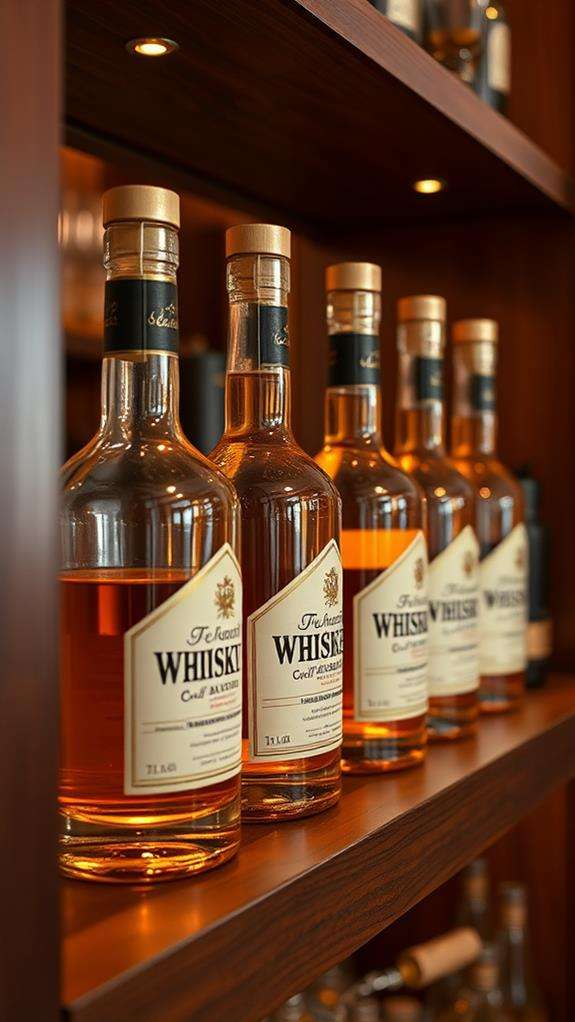
To protect your whiskey investment, you'll need to master proper storage techniques, including keeping bottles upright and away from direct sunlight in a dedicated cabinet or cellar. Controlling lighting conditions is vital, as UV rays can degrade your whiskey's quality over time, so opt for a dark storage space or use UV-protective glass containers when displaying your collection. Maintaining a consistent temperature between 59-68°F (15-20°C) is essential, and you should avoid areas with frequent temperature fluctuations, such as garages or rooms with exterior walls, as these changes can affect the whiskey's aging process and potentially compromise the bottle's seal.
Proper Storage Techniques
Proper whiskey storage techniques safeguard your investment and help maintain the spirit's quality for decades. When storing your unopened whiskey bottles, you'll need to take into account three essential factors: temperature, light exposure, and bottle positioning. A consistent environment is vital for preserving your collection's integrity and preventing premature aging or flavor deterioration.
- Keep your whiskey at a stable temperature between 59-68°F (15-20°C), avoiding fluctuations that can cause the liquid to expand and contract, potentially compromising the cork's seal.
- Store bottles away from direct sunlight and UV rays, as light exposure can trigger chemical reactions that alter the whiskey's color and taste profile.
- Position bottles upright to prevent extended contact between the high-alcohol spirit and the cork, which can lead to cork degradation and unwanted flavor transfer.
You'll want to designate a dedicated storage space that's cool, dark, and away from heating vents or external walls. A basement or interior closet often works well, but make sure there's adequate ventilation to prevent mustiness. If you're storing multiple bottles, think about installing adjustable shelving to accommodate different bottle sizes while maintaining proper vertical positioning.
Controlling Lighting and Temperature
Light and temperature management stands at the forefront of protecting your whiskey investment. You'll want to keep your unopened whiskey bottles away from direct sunlight and artificial lighting, as UV rays can trigger chemical reactions that break down the whiskey's complex compounds, affecting both its flavor and appearance over time.
Store your bottles in a cool, dark place where the temperature remains relatively constant, ideally between 59-68°F (15-20°C). Temperature fluctuations can cause the liquid to expand and contract, potentially compromising the seal and accelerating the aging process. If you're storing your collection in a basement or cellar, you'll need to monitor humidity levels, as excessive moisture can damage labels and corrode metal caps.
Don't make the mistake of keeping whiskey in your kitchen or near windows, where it's exposed to temperature swings and bright light. Instead, opt for a dedicated cabinet, closet, or wine cellar. If you're storing multiple bottles, consider investing in a temperature-controlled cabinet with UV-protected glass. This setup will help maintain ideal conditions and protect your whiskey's integrity for years to come.
Frequently Asked Questions
Can Unopened Whiskey Get Stronger or Increase in Alcohol Percentage Over Time?
No, your unopened whiskey won't get stronger over time. Unlike wine, whiskey stops aging once it's bottled, and its alcohol content remains stable. The ABV (alcohol by volume) percentage you see on the bottle will stay exactly the same, whether it's stored for one year or twenty years. While some flavor compounds might develop subtle changes, the actual alcohol percentage is fixed and won't increase during storage.
Will Collectible Whiskey Bottles Lose Value if Stored in Original Packaging?
Your collectible whiskey bottles won't lose value when stored in their original packaging, as long as you're maintaining proper conditions. You'll want to keep them upright, away from direct sunlight, and at a consistent room temperature. The original boxes, tubes, or display cases actually help protect the bottles and maintain their authenticity, which collectors value highly. If anything, pristine original packaging can enhance the whiskey's future resale value.
Does Whiskey Continue to Age in the Bottle Like Wine?
No, your whiskey won't continue aging once it's bottled. Unlike wine, whiskey's aging process stops completely when it's removed from its oak barrel and sealed in glass. The barrel interaction is essential for aging, as it's where whiskey develops its complex flavors and color. While extremely long storage might cause very slight changes due to evaporation or light exposure, you won't get the same maturation benefits that occur during proper barrel aging.
Can Sealed Whiskey Bottles Be Safely Transported on International Flights?
While you might dream of floating through customs with your prized whiskey collection, there are strict rules to follow. You can transport sealed whiskey bottles internationally, but you'll need to pack them in your checked baggage, not carry-on. They must comply with customs regulations and alcohol volume limits of your destination country. Also, remember to declare them and pack them carefully to prevent breakage during transit.
Should Luxury Whiskeys Be Insured When Stored for Extended Periods?
You should definitely consider insuring valuable whiskeys if they're part of a significant collection or investment. It's wise to add them to your homeowner's policy through a special rider or get specialized spirits insurance, particularly for bottles worth over $1,000. Contact insurers who specialize in covering rare spirits, as they'll understand proper valuation and storage requirements. Don't forget to document your collection with photos and purchase receipts.





